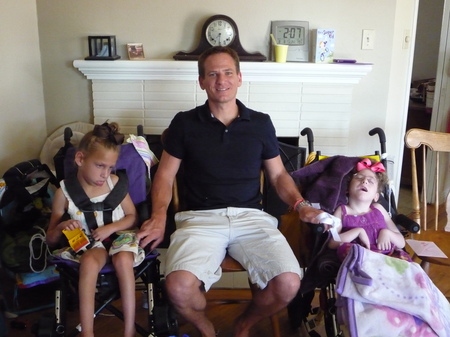Congenital CMV: A Family’s Journey
By Julie Ruel, Social Media Manager, Stanford Blood Center
Cytomegalovirus (CMV) is not an unfamiliar term in the blood banking world. A member of the herpes family, it is one of the many tests we perform on each unit of donated blood. For healthy individuals, having the virus, or what we refer to as being CMV positive, isn’t harmful. And if healthy, unless you’ve specifically been tested for CMV, you most likely don’t know whether you have the antibody to it or not. However, for infants or those with impaired immune systems, it can be deadly. Because of this, Stanford Blood Center routinely tests for it and was in fact, the first blood center in the world to provide CMV negative blood to hospitals for immunocompromised transfusion recipients.
About 50 percent of us will have contracted the virus by the time we reach adult age. What I’ll be sharing here, though, is the story of a family whose twin girls developed the virus congenitally, leaving them severely disabled.
Janelle Greenlee and her husband, Eddy, found out seven weeks into her second pregnancy that they were having twins. Although thrilled, they wondered how in the world they would be able to handle a toddler plus twin infants! These ultrasound results classified her pregnancy as high-risk. But what they found out weeks later seemed to be a serious cause for concern. Abnormalities of the brain were found on one of the twins and it was recommended that they terminate the pregnancy. Opting to continue on, Janelle was soon after put on bed rest for the remainder of her pregnancy.
Rachel and Riley were born on August 8, 2003, crying and breathing on their own. Nonetheless, they were taken to the NICU where some observations and tests were done. Janelle recalls the devastating information they were given about Rachel. “Her MRI showed severe brain damage and a virus called CMV was suspected as the cause. We were told by the neonatologist that there was a 90 percent chance that Rachel would be severely mentally compromised or die. We were destroyed and came to learn that we knew nothing about this new word that was about to rule our life.” Rachel was diagnosed with congenital CMV, which, unknown to Janelle, she herself had contracted early in her pregnancy. The effects of this virus on the little girl include microcephaly (small head and brain), cerebral palsy, deafness, impaired vision, and seizure disorder. They were devastated to find out that Riley also tested positive for CMV. Her condition is less severe but, like Rachel, she also suffers from deafness and cerebral palsy.
Above, Eddy and his two girls enjoying some time together.
Congenital CMV is a condition that affects 1 in 150 babies yet tests for it are not routinely done during pregnancy. It can be transferred to an unborn child only if the mother is infected during pregnancy and it is more likely to cause defects if infection happens during the early term. Some simple precautions to take if pregnant include washing hands often, avoiding sharing food and utensils with babies and children, and avoiding contact with saliva when kissing babies and children on the face.
Eddy can lightly joke about having a PhD on the subject that just years ago he had never heard of. And Janelle has since started a non-profit organization, Stop CMV, to raise awareness of the virus. Together, they have raised two special girls (in addition to their two sons) who will turn eight next month, have many, many friends, and are quite popular in their community! Perhaps it was the pact they made shortly after the girls were born that has given them the strength they needed to persevere. “Our family decided that our main concern was to give the twins everything that we could for however long we may have them and to love them for whatever and whoever they are, not what they aren’t.”
Please click here to read more about Riley and Rachel’s story.


